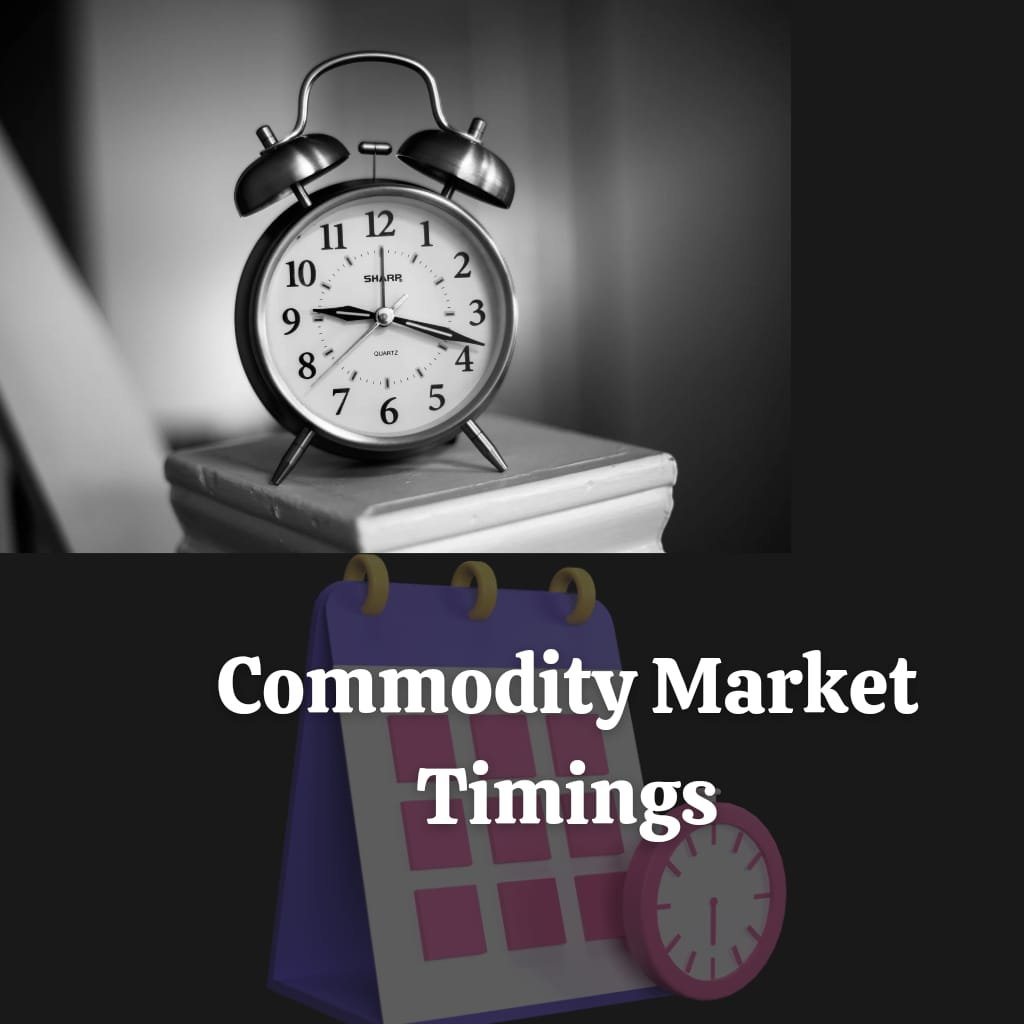commodity trading time

The world of commodity trading is dynamic and thrilling, but timing is everything. You need to be aware of the commodity markets’ opening and closing timings in order to succeed in this industry. The secret to becoming lucrative in the stock market is knowing when to purchase and sell, regardless of expertise level.
In order to help you navigate the game and make wise trading decisions, we will provide you with all the information you need to know about the timing and trading hours of commodity markets in this post
Table of Contents
Comprehending the Trading Time of Commodities
It’s critical that you Comprehend Commodity Trading hours and times if you’re interested in trading commodities. Commodity markets operate on a distinct timetable and have varying trading hours based on the commodity, unlike stock markets.
The commodity market’s ten primary sessions are:
European session, Asian session, and American session
Every session has distinct characteristics and trading hours of its own. Due to their great demand, some commodities, including gold and crude oil, enjoy prolonged trading hours.
Comprehending these trading hours facilitates the development of strategies, trend monitoring, and educated decision-making for traders. You may remain competitive and optimize your profits by keeping up of commodity market timings.
Commodity Trading Hours: Crucial Times to Be Aware of for Success
One common way to diversify your portfolio through investing is through commodity trading. Understanding when to trade commodities can have a big impact on your success. We’ll discuss the importance of different commodities’ trading hours in this blog article, as well as how to use this knowledge to improve your trading approach.

What is trading in commodities?
Purchasing and selling raw commodities or primary goods, such as gold, silver, oil, natural gas, and agricultural items, is known as commodity trading. These commodities are traded throughout the world on a number of markets, each having its own trading hours.
The Significance of Trading Time
When trading commodities, timing is everything. Commodity Markets typically run almost around the clock, in contrast to stock markets, which have set trading hours. Still, trading at these peak hours might provide higher liquidity, narrower spreads, and more lucrative chances because certain hours are busier than others.
Key Exchanges for Commodities and Their Trading Hours
Below is a summary of the main commodities’ trading hours:
Mercantile Exchange of New York (NYMEX)
Gold and Silver: Monday through Friday, 8:20 AM to 1:30 PM ET, is the open outcry.
Electronic: Sunday TO Friday, 6:00 PM to 5:00 PM ET
Crude Oil: Monday to Friday, open outcry is from 9:00 AM to 2:30 PM ET.
Electronic: Sunday To Friday, 6:00 PM to 5:00 PM ET
Board of Trade of Chicago (CBOT)
Corn, wheat, and soybeans: Monday to Friday, open outcry hours are 9:30 AM to 1:15 PM ET.
Electronic: Sunday to Friday, 9:30 AM to 2:20 PM ET and 8:00 PM to 8:45 AM ET
Transcontinental Trade (TIC)
Brent Crude Oil: Electronic: Sunday to Friday, 8:00 PM to 6:00 PM ET
Coffee, Sugar, or Cocoa: Monday to Friday, 8:00 AM to 1:30 PM ET, Open Outcry
Electronic: Monday to Friday, 3:30 AM to 1:30 PM ET

Ideal Times for Commodity Trading
Take into account the following advice to maximize your trading opportunities:
Peak Trading Hours: When key market sessions coincide, such as when US and European markets are open, that is when trading is most profitable.
Higher liquidity and greater trade volume are typically experienced during this time, which is between 8:00 AM and 12:00 PM ET.
Steer out of Low Liquidity Periods: Wider spreads and more expensive trading can result from low liquidity periods, which include late nights and early mornings when markets are closed. Trading should be avoided during these times.
Economic Announcements: Keep an eye out for reports and announcements related to the economy, such as the crude oil inventory data from the US Department of Energy, as these can have a big impact on prices.
Trading in Commodities: Holidays
There are designated holidays on which trade is suspended in commodity markets. Major exchanges usually fall on certain holidays:
On January 1,
The Fourth of July
Thanksgiving Weekend
Christmas Day
Note: For the most recent holiday schedules, traders should check with their individual exchanges. It is important to confirm the precise trading hours with the exchange, as some may only have partial trading hours on specific holidays.

Factors Influencing the Times of Commodity Trading
Trading hours and circumstances can be affected by a number of factors:
Exchange Market Hours: It is important to arrange your trades within these hours as each exchange has distinct trading hours for various commodities.
Global Events: Trading volumes and price fluctuations can be impacted by weather, geopolitical events, and economic news.
Liquidity is impacted by the day-to-day fluctuations in trading volumes. Greater liquidity is often available during peak trading hours.
Time Zone Differences: Different time zones are used by different exchanges. Recognize these variations in order to schedule your trading operations according to market hours.
Seasonal Trends: Depending on the weather, agricultural cycles, or consumer trends, several commodities exhibit seasonal trade patterns.
Some Tips for Profitable Commodity Investing
Remain Up to Date: Stay informed on the most recent developments and patterns in the commodities you trade. Commodity prices are influenced by weather, geopolitical events, and economic considerations.
Apply Technical Analysis: Charts and indicators can be used to spot trends and possible entry and exit locations. You may use this to make better trading selections.
Control Your Risk: To safeguard your investments from unforeseen market fluctuations, place stop-loss orders and closely monitor your positions.
Start small. If you’re new to trading commodities, start off with a little investment and raise it gradually as you get more seasoned.
In summary
Optimizing your trading strategy requires an understanding of the various commodities’ trading times.
You can increase your chances of success in the commodity markets by trading at peak hours and keeping up with market circumstances. As you trade, never forget to take calculated risks and never stop learning.
